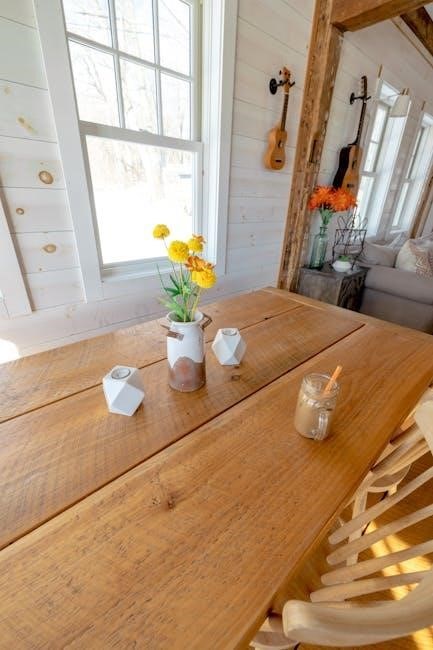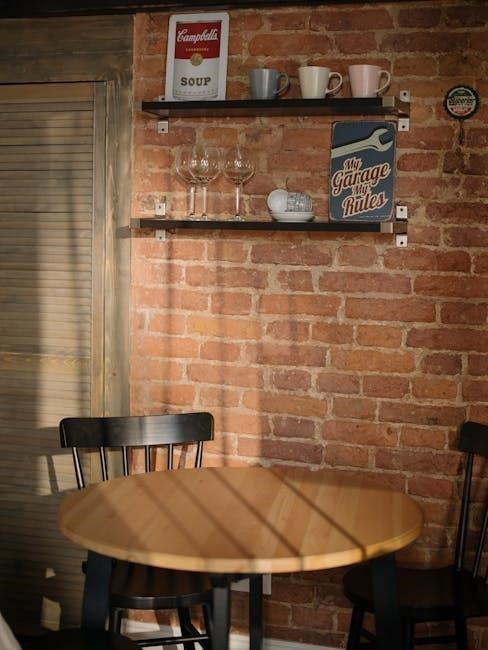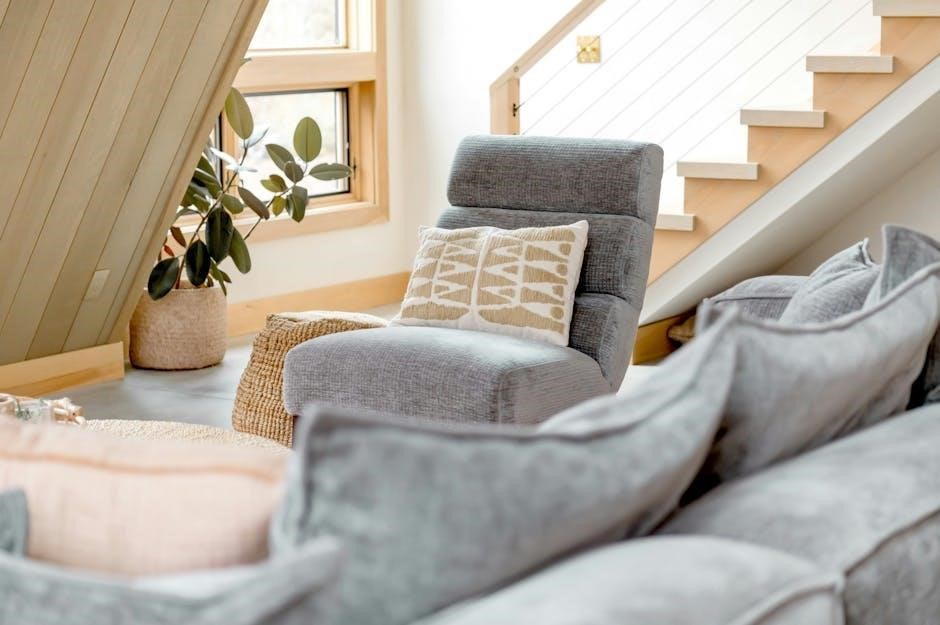An Airbnb House Rules PDF serves as a comprehensive guide for guests, outlining expectations to ensure a smooth stay. It includes check-in times, noise policies, and pet rules, helping hosts maintain their property and prevent misunderstandings. Customizable templates are widely available online, making it easy to create and update rules tailored to specific needs. This document is essential for protecting both hosts and guests, ensuring a mutually respectful and enjoyable experience. By providing clear guidelines, hosts can foster positive interactions and safeguard their property effectively.
What is an Airbnb House Rules PDF?
An Airbnb House Rules PDF is a formal document outlining the rules, regulations, and guidelines guests must follow during their stay. It serves as a legally binding contract between hosts and guests, ensuring mutual understanding and respect for the property. The PDF typically includes key components like check-in/out times, noise restrictions, guest limits, and prohibited activities. Customizable templates are available online, allowing hosts to tailor rules to their specific property needs. This document helps protect both parties and ensures a smooth, enjoyable experience for everyone involved.
Importance of Having House Rules for Airbnb Hosts
Establishing clear house rules is essential for Airbnb hosts to protect their property, ensure guest compliance, and maintain a positive experience for all parties. Well-defined rules help prevent damage, noise complaints, and unauthorized activities, reducing potential liabilities. They also provide clarity for guests, minimizing misunderstandings and fostering mutual respect. By setting expectations upfront, hosts can safeguard their investment, streamline communication, and ensure a smooth, enjoyable stay for everyone involved while maintaining legal and regulatory compliance.

Key Components of Airbnb House Rules
Airbnb House Rules typically include check-in/out times, noise restrictions, guest limits, parking guidelines, pet policies, smoking prohibitions, and trash disposal instructions. These components ensure clarity and compliance, protecting both hosts and guests while promoting a respectful and secure environment for all parties involved in the rental agreement.
Check-In and Check-Out Times
Check-in and check-out times are essential components of Airbnb house rules, ensuring a smooth transition between guests. Typically, check-in is set between 4 PM and 6 PM, while check-out is by 10 or 11 AM. These times allow hosts to prepare the property thoroughly. Flexibility can be offered for early arrivals or late departures, but guests must request this in advance. Late check-outs without approval may incur additional fees. Clear communication of these times prevents misunderstandings and helps maintain a respectful and organized rental process for both hosts and guests.
Noise Restrictions and Quiet Hours
Noise restrictions and quiet hours are crucial for maintaining a peaceful environment, especially in residential areas. Hosts often specify quiet times, typically between 10 PM and 8 AM, to minimize disturbances. Guests are expected to keep noise levels low and avoid loud gatherings or parties. These rules help ensure respect for neighbors and provide a restful stay for guests. Violating noise policies may result in penalties or even eviction. Clear communication of these guidelines in the House Rules PDF helps set expectations and promotes a harmonious experience for everyone involved.
Guest Limits and Visitor Policies
Guest limits and visitor policies are essential to ensure the property is not overcrowded and to maintain security. Hosts typically specify the maximum number of guests allowed, which must match the number stated in the booking. Visitors not listed in the reservation may require prior approval. Some hosts also require ID verification for all occupants. Exceeding guest limits or unauthorized visitors can lead to penalties or cancellation of the stay. Clear communication of these rules helps prevent disputes and ensures a smooth experience for both hosts and guests. This section is vital for safeguarding the property and its occupants.
Parking and Vehicle Regulations
Parking and vehicle regulations are crucial for maintaining order and safety. Hosts often specify designated parking areas, such as assigned spaces or street parking restrictions. Guests must adhere to local parking laws and any permits required. Some properties prohibit certain types of vehicles, like RVs or trailers, to protect the property and neighboring areas. Violating these rules may result in towing or penalties. Clear communication of parking policies ensures a seamless experience and prevents potential disputes. This section is vital for safeguarding the property and its surroundings.
Pet Policies
Pet policies outline rules for guests bringing animals to ensure the property remains clean and undamaged. Many hosts allow only specific types or sizes of pets, such as small dog breeds under 20 pounds. Guests may be required to clean up after their pets and avoid leaving them unattended. Some properties prohibit exotic animals or pets in certain areas. Violations of pet policies can lead to penalties or loss of the security deposit. Clear guidelines help maintain a pleasant environment for future guests and protect the host’s property from potential damage.
Smoking and Substance Use
Smoking and substance use policies are crucial for maintaining a clean and safe environment. Smoking is often strictly prohibited inside the property, with some hosts allowing it only in designated outdoor areas. The use of illegal substances is typically banned outright. Guests must adhere to these rules to avoid penalties, such as losing their security deposit or facing reservation cancellation. Clear guidelines help protect the property from damage and ensure a pleasant stay for all guests, fostering a respectful and safe space for everyone involved.
Prohibited Activities and Items
Prohibited activities and items are essential to safeguard the property and ensure guest safety. Common prohibitions include parties, illegal substances, weapons, and unauthorized furniture. Items like candles, fireworks, or wild animals are often banned due to fire hazards or damage risks. Guests must avoid activities that could harm the property or disturb neighbors. Violating these rules may result in penalties, such as losing the security deposit or being asked to leave. Clear restrictions help maintain a safe and respectful environment for everyone involved.
Trash and Recycling Guidelines
Trash and recycling guidelines ensure the property remains clean and environmentally friendly. Guests must separate recyclables from general waste and use designated bins. Trash should not be left outside or in shared spaces. Hosts may specify collection days or require guests to dispose of trash before checkout. Failure to follow these rules may result in additional cleaning fees. Clear guidelines help maintain a tidy property and promote eco-conscious practices, benefiting both the host and the environment. Adherence is crucial for a smooth and responsible stay.
Use of Amenities and Shared Spaces
Use of amenities and shared spaces must be respectful and considerate of other guests and property owners. Guests should clean up after using shared areas like kitchens or laundry facilities. Pools, gyms, or communal lounges may have specific hours or rules to ensure availability for all. Returning borrowed items, like keys or equipment, is essential. Notify the host of any damages or issues promptly. Proper use of shared spaces fosters a positive environment and ensures a pleasant stay for everyone involved. Clear guidelines help maintain order and harmony.
Cleaning and Maintenance Expectations

Cleaning and maintenance expectations are essential for preserving the property’s condition. Guests are responsible for keeping the space tidy, including shared areas. Dispose of trash and recyclables properly, and clean up after using amenities. Return any borrowed items and report damages promptly to avoid security deposit deductions. Respect the property and complete any check-out cleaning tasks. Clear guidelines ensure a pleasant stay for everyone and prevent misunderstandings.
Wi-Fi and Technology Usage
Wi-Fi and technology usage guidelines ensure a seamless experience for guests. Share the network name and password upon check-in, specifying that it’s for registered guests only. Prohibit unauthorized devices from connecting to the network. Streaming or downloading large files may be restricted to prevent bandwidth issues. Guests must not access or alter any security settings or devices. Provide contact information for technical support if issues arise. These rules help maintain internet security and ensure fair access for all users during their stay.

Creating an Effective Airbnb House Rules Template
A well-crafted Airbnb House Rules Template ensures clarity and protection for both hosts and guests. Use clear language, cover key areas like check-in, noise, and pets, and make it visually appealing with icons for better understanding. Regular updates and customization tailored to your property enhance effectiveness. Free online tools and templates simplify the process, helping you create a professional document that aligns with Airbnb’s policies and your specific needs.
Steps to Develop a Comprehensive House Rules Document
Start by outlining key areas such as check-in/out times, noise restrictions, and guest limits. Include specific rules for pets, smoking, and prohibited items. Use clear, concise language and organize the document logically. Incorporate visuals like icons or images for better understanding. Ensure compliance with local laws and Airbnb policies. Regularly update the document to reflect changes in property rules or regulations. Finally, proofread and customize the template to match your property’s unique needs, ensuring it is both protective and guest-friendly.
How to Customize Templates for Your Property
To tailor your Airbnb house rules PDF, start by selecting a template that aligns with your property type. Identify key sections like check-in/out times, noise policies, and pet rules, and modify them to suit your needs. Add specific details such as parking instructions or local attractions. Use tools like Canva to enhance the design and ensure the document reflects your property’s unique character. Finally, review and update the template periodically to keep it relevant and effective for your guests.
Best Practices for Clear and Concise Language
When creating your Airbnb house rules PDF, use simple and direct language to avoid confusion. Avoid jargon or overly complex terms, ensuring rules are easy to understand. Organize information into bullet points or short paragraphs for better readability. Be specific about expectations, such as “Quiet hours from 10 PM to 8 AM” or “No pets over 20 pounds.” Including examples can also clarify ambiguous rules. Consistency in tone and structure helps guests grasp the guidelines quickly, reducing misunderstandings and ensuring a smooth experience for both hosts and guests.
Legal Considerations and Liability Protection
When drafting your Airbnb house rules PDF, ensure compliance with local laws and regulations to protect yourself and your property. Clearly outline penalties for rule violations, such as security deposit deductions or reservation cancellation. Include specific clauses addressing liability, such as damage to property or unauthorized activities. Align your rules with Airbnb’s policies, like AirCover, to maximize protection. Consulting a legal expert can help verify that your document meets all requirements and safeguards your interests effectively while maintaining guest accountability.
How to Include Visuals and Icons for Better Understanding
Enhance your Airbnb house rules PDF by incorporating visuals and icons to make the guidelines more engaging and easier to follow. Use platforms like Canva to design custom icons for key sections, such as checkmarks for allowed items or X marks for prohibited activities. Include images of amenities or maps of shared spaces to provide clarity. Visual aids like timelines for check-in/out or infographics for trash sorting can also improve comprehension. Ensure visuals are simple, consistent, and complement the text to avoid overwhelming guests while maintaining a professional look.
Free Resources and Templates Available Online
Discover a variety of free Airbnb house rules templates and resources online to streamline your hosting process; Websites like Canva and hosting blogs offer customizable PDF templates that cover essential topics such as check-in times, noise restrictions, and pet policies. These templates are designed to be user-friendly, allowing you to tailor rules to your property’s unique needs. Additionally, many templates include visuals and icons to enhance clarity. Downloading these resources saves time and ensures your house rules are clear, concise, and professionally presented for your guests.

Implementing House Rules on Airbnb Platform
Efficiently upload and manage your house rules PDF on Airbnb by following platform guidelines. Ensure compliance with Airbnb’s policies, clearly communicate expectations, and prevent rule violations to foster positive guest interactions.
Navigating Airbnb’s House Rules Section
To effectively manage your property’s guidelines, navigate to the House Rules section on Airbnb. Log in to your host account, select “Manage Listings,” and choose your property. Scroll to the House Rules area, where you can add, edit, or upload your pre-prepared PDF. Ensure all rules are clear, concise, and comply with Airbnb’s policies. This section allows you to outline expectations for check-in, noise levels, guest limits, and more, helping to prevent misunderstandings and protect your property. Regular updates are essential to maintain relevance and compliance with changing regulations.
How to Upload and Update Your House Rules PDF
Uploading your Airbnb House Rules PDF is straightforward. Log in to your host account, go to “Manage Listings,” and select your property. Under the House Rules section, click “Upload PDF” to attach your document. Ensure the file is clear and concise, covering all essential guidelines. Regular updates are crucial to reflect changes in policies or property specifics. By maintaining an up-to-date PDF, you provide guests with clear expectations, reducing misunderstandings and protecting your property. This step ensures compliance with Airbnb’s requirements and enhances the overall guest experience.
Ensuring Compliance with Airbnb Policies
Ensuring your Airbnb House Rules PDF complies with Airbnb’s policies is crucial for maintaining a positive hosting experience. Review Airbnb’s guidelines to align your rules with their requirements. Include specific details like check-in times, noise levels, and guest limits to prevent violations. Ensure your rules do not conflict with local laws or Airbnb’s terms of service. Transparency in your rules helps guests understand expectations, reducing potential disputes. Regularly update your PDF to reflect any changes in Airbnb’s policies or local regulations, ensuring ongoing compliance and a smooth experience for both hosts and guests.
Communicating Rules to Guests Before and During Stay
Clear communication of your Airbnb House Rules PDF is essential to ensure a smooth guest experience. Send the PDF to guests before their arrival, highlighting key rules like check-in times, noise restrictions, and pet policies. Use Airbnb’s messaging system to remind guests of important guidelines. Provide a printed copy of the rules in the rental for easy reference. During their stay, address any questions promptly and maintain open lines of communication. Consistent and clear communication helps prevent misunderstandings and ensures a respectful, enjoyable stay for everyone involved.
Common Mistakes to Avoid When Creating House Rules
When crafting an Airbnb House Rules PDF, avoid overly restrictive or vague rules that confuse guests. Ensure rules are updated regularly and align with local laws. Clearly outline emergency procedures and avoid ambiguous language to prevent misunderstandings. Rules should be reasonable, enforceable, and easy to understand, fostering a positive experience for both hosts and guests while protecting the property effectively.
Overly Restrictive or Confusing Rules
Creating overly restrictive or confusing rules can deter potential guests and lead to negative reviews. Hosts should avoid ambiguous language, such as “keep the noise down,” and instead specify quiet hours or decibel limits. Excessive rules may make guests feel unwelcome, while unclear guidelines can result in unintentional violations. It’s essential to strike a balance by setting fair, reasonable expectations that protect the property without overwhelming guests. Using clear, concise language ensures guests understand and adhere to the rules effortlessly.
Failure to Update Rules Regularly

Failing to update house rules regularly can lead to misunderstandings and potential disputes with guests. As local laws, property conditions, and guest expectations evolve, outdated rules may become irrelevant or ineffective. Hosts should review and revise their rules periodically to reflect changes in their property, neighborhood, or legal requirements. Neglecting updates can result in enforcement challenges, negative reviews, or even penalties. Regular updates ensure clarity, compliance, and a smoother hosting experience for both parties. Consistent revisions help maintain trust and avoid conflicts.
Not Addressing Local Laws and Regulations
Overlooking local laws and regulations in your house rules can lead to legal complications and potential fines. Hosts must ensure their rules align with local ordinances, such as noise restrictions, zoning laws, and health regulations. Failure to comply may result in penalties or conflicts with authorities. Including specific references to local laws in your house rules helps protect both hosts and guests. Regularly updating your rules to reflect changing regulations is essential for maintaining compliance and avoiding liability issues. Clear adherence to local laws fosters a responsible hosting environment.
Neglecting to Include Emergency Procedures
Omitting emergency procedures in your house rules can leave guests unprepared for critical situations. Include details like fire extinguisher locations, first aid kits, and emergency contact numbers. Clearly outline steps for power outages, gas leaks, or natural disasters. Also, provide evacuation routes and nearby hospital information. Failing to include these procedures can lead to panic and potential harm. Ensuring guests know what to do in emergencies is vital for their safety and your liability protection. Always update emergency procedures to reflect property changes or new local guidelines.
Using Ambiguous or Vague Language
Using ambiguous or vague language in your house rules can lead to confusion and misinterpretation by guests. Clearly define expectations to avoid disputes. For example, instead of saying “keep the noise down,” specify quiet hours. Avoid phrases like “be reasonable” or “clean up after yourself,” as these are open to interpretation. Use specific, actionable language to ensure guests understand their responsibilities. Vague rules may result in non-compliance or negative reviews, so precision is key to maintaining a smooth hosting experience and protecting your property. Clarity fosters respect and adherence to your guidelines.

Best Practices for Managing House Rules
Regularly update rules based on guest feedback and local regulations. Ensure clarity and enforceability while maintaining a positive host-guest relationship. This fosters trust and compliance.
Regularly Reviewing and Updating Rules
Regularly reviewing and updating house rules ensures they remain relevant and effective. Hosts should incorporate guest feedback and adapt to local legal changes. This process helps clarify ambiguous points and addresses new challenges, such as emerging technologies or shifting community standards. Updating rules also demonstrates a commitment to improving the guest experience while protecting the property. By keeping rules current, hosts can prevent conflicts and ensure compliance with evolving regulations, fostering trust and mutual understanding between hosts and guests.

Using Guest Feedback to Improve Rules
Guest feedback is invaluable for refining Airbnb house rules. By reviewing comments and suggestions, hosts can identify areas needing clarification or adjustment. Addressing common concerns, such as check-in times or noise levels, ensures rules better meet guest needs. Incorporating feedback demonstrates respect for guests’ experiences, fostering trust and satisfaction. Regularly updating rules based on feedback also shows a commitment to continuous improvement, enhancing both guest comfort and property protection. This collaborative approach helps create balanced and fair guidelines for all parties involved.
Ensuring All Rules Are Reasonable and Enforceable
Creating reasonable and enforceable house rules is essential for a harmonious hosting experience. Rules should be fair, clear, and aligned with local laws to avoid legal disputes. Hosts must ensure that regulations are practical and respect guests’ comfort while protecting the property. Consulting legal experts can help draft policies that are both enforceable and respectful. Clear communication of expectations prevents misunderstandings and fosters trust. By balancing fairness and enforceability, hosts create a respectful environment, ensuring both parties’ needs are met effectively.

Maintaining a Good Host-Guest Relationship
Maintaining a positive host-guest relationship is crucial for a successful Airbnb experience. Clear communication and empathy are key to resolving issues amicably. Hosts should be approachable and responsive to guests’ needs while setting clear boundaries. Providing a well-organized house rules document ensures mutual understanding and respect. By fostering trust and addressing concerns promptly, hosts can create a welcoming environment that encourages positive reviews and repeat bookings. A good relationship enhances guest satisfaction and protects the property, benefiting both parties long-term.
Keeping Rules Concise and Easy to Understand
Keeping house rules concise and easy to understand ensures guests can quickly grasp expectations without confusion. Use clear, straightforward language and avoid overly complex terms. Organize rules into bullet points or short paragraphs for better readability. Prioritize essential guidelines and eliminate redundancy. Avoid legal jargon to make the document guest-friendly. Including visuals like icons or headings can further enhance clarity. Regularly review and refine your rules to keep them relevant and simple, ensuring a smooth experience for both hosts and guests.

Case Studies and Real-Life Examples
Real-life examples demonstrate how clear house rules improve guest satisfaction and reduce issues. Hosts who implemented detailed rules reported fewer misunderstandings and higher ratings, ensuring smoother stays.
Successful Implementation of House Rules
Hosts who clearly communicate house rules often experience fewer issues during stays. For example, one host reduced noise complaints by 50% after implementing quiet hour policies. Another host used a detailed check-in template to streamline guest arrivals, improving overall satisfaction. By enforcing rules like no unauthorized guests or pets, hosts have reported fewer property damages and smoother interactions. These examples highlight how well-crafted rules can enhance the rental experience for both hosts and guests, fostering mutual respect and understanding.
Common Violations and How to Handle Them
Common violations include unauthorized parties, exceeding guest limits, and ignoring quiet hours. Hosts should address these issues promptly by communicating clearly with guests. Send a polite reminder or warning, emphasizing the importance of adhering to rules. For recurring violations, consider charging fees or deducting from the security deposit. In severe cases, such as illegal activities, hosts may need to involve local authorities or terminate the stay. Documenting violations with photos or messages can provide evidence if disputes arise. Consistent enforcement ensures respect for property and rules, maintaining a positive hosting experience for all parties involved.
Examples of Effective Rule Enforcement
Effective rule enforcement often involves clear communication and consistent consequences. For instance, hosts who implement strict noise policies may charge a fee for violations or request quiet after 10 PM. Some hosts use security cameras or noise-monitoring devices to ensure compliance. Others include reminders in their house manual to reinforce rules. Charging extra for unauthorized guests or pets encourages adherence. By setting clear consequences in the House Rules PDF, hosts can minimize disputes and ensure a smooth experience for both parties. This proactive approach fosters respect and accountability;
How Clear Rules Can Improve Guest Satisfaction
Clear house rules enhance guest satisfaction by setting expectations upfront, reducing misunderstandings. Guests appreciate knowing check-in times, noise restrictions, and pet policies in advance. A well-structured Airbnb House Rules PDF ensures visitors feel prepared, leading to a smoother stay. Transparent guidelines also foster respect for the property, encouraging guests to leave positive reviews. By addressing potential issues proactively, hosts create a stress-free environment, which often results in higher ratings and repeat bookings. Clear communication is key to a positive experience for both hosts and guests alike.
Lessons Learned from Experienced Hosts
Experienced hosts emphasize the importance of clear, concise house rules to avoid disputes. Many recommend including specific details like check-in times, noise limits, and pet policies. Regular updates to rules based on guest feedback are crucial. Using visuals like icons or checklists can enhance understanding. Seasoned hosts also stress the need for a friendly yet firm tone to maintain guest respect. These insights help create a balanced, guest-friendly environment while protecting the property. Learning from others’ experiences ensures a smoother hosting journey.
An Airbnb House Rules PDF is essential for protecting your property and fostering positive guest interactions. Clear guidelines ensure mutual respect and a smooth experience for everyone involved.
Final Thoughts on Airbnb House Rules PDF
A well-crafted Airbnb House Rules PDF is indispensable for hosts seeking to protect their property and ensure a harmonious guest experience. By outlining clear expectations, it prevents misunderstandings and fosters mutual respect. Customizable templates allow hosts to tailor rules to their unique needs, addressing everything from check-in times to pet policies. Regular updates and guest feedback can refine these documents over time, ensuring they remain relevant and effective. A thoughtfully designed house rules PDF not only safeguards the host but also enhances guest satisfaction, creating a win-win situation for all parties involved.
Encouragement to Use and Customize Templates
Using a customizable Airbnb House Rules PDF template is a smart way to streamline your hosting process. Templates save time and ensure consistency, allowing you to focus on providing an exceptional guest experience. By tailoring the rules to your property’s unique needs, you can address specific concerns and create a professional, clear guide for guests. Customization also helps ensure compliance with local laws and Airbnb policies, reducing potential liabilities. Invest in a template today and enhance your hosting journey with ease and confidence.
Importance of Continuous Improvement
Regularly updating your Airbnb House Rules PDF is vital to stay aligned with changing laws, guest expectations, and property needs. Continuous improvement ensures rules remain relevant and effective, addressing new challenges and incorporating feedback. By refining your guidelines, you can enhance guest satisfaction, reduce potential disputes, and maintain a positive hosting experience. Keeping your rules up-to-date demonstrates professionalism and adaptability, ensuring your property remains a desirable and well-managed destination for travelers. This proactive approach fosters trust and long-term success in the competitive short-term rental market.
